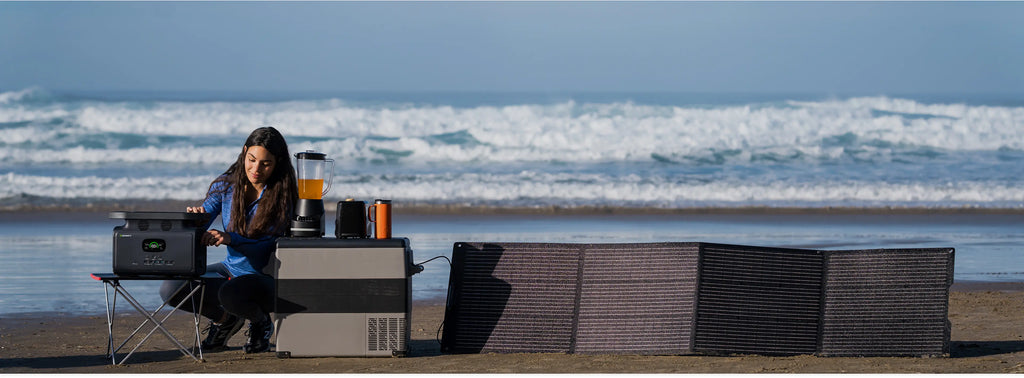
“Can you charge solar batteries without a charge controller?”
Here’s the quick and dirty: A charge controller’s role is to make sure you don’t undercharge or overcharge. So the answer is: It depends on whether your solar panel input voltage and current during power production are within the safe operating limits of your battery AT ANY TIME. If they don’t, you need a charge controller, or else you risk permanent damage.
If that answers your question, then great! We’re happy to have provided you with the value you need in one shot.
But if you want to learn more about the process, read on as we break it into more digestible chunks—and more bonus information.
How can you charge solar batteries without a charge controller?
What is a solar charge controller?
What types of charge controllers are there?
What are the solar panel ratings you should compare to your battery ratings?
These are the questions we will answer for you today.
What is a Solar Charge Controller?
Given that solar panels and batteries are both direct current (DC) devices, it’s typical for some people to believe that they are plug-and-play (Hint: They are not).
So this misunderstanding often ends with a disgruntled buyer or head scratches.
Therefore, it’s safe to say that there’s a lot to be gained from knowing the basics of a solar charge controller.
In a nutshell, solar charge controllers act as battery protection devices and solar charging optimizers. It serves as the bridge between solar panels and batteries. Depending on your budget and solar setup, you can choose either a PWM or MPPT charge controller.

Solar charge controllers act as battery protection devices and solar charging optimizers.
But can you charge solar batteries without a charge controller?
Yes. By matching solar panel output with battery input requirements.
How Can You Charge Solar Batteries without a Charge Controller?
Connecting solar panels and batteries without a charge controller is doable, but only if your solar panel voltage and current ratings (at maximum power production) fall within your battery’s charging input specifications.
Batteries for solar setups are usually rated at 12V and 24V. They also come with a “charging profile” that states the voltage range your battery can accept. (Tip: If you don’t know your voltage range, you can ask your battery manufacturer about it.)
Regarding ballpark figures, 12V batteries can safely charge from solar panels rated between 11.8V to 14.5V. In contrast, 24V batteries allow 24V to 29V.
These values apply to both NMC and LFP lithium-ion batteries and traditional lead-acid, AGM, and GEL batteries.
However, here lies the problem—As you can see in some sample solar panel specs we found online, the typical Maximum Power Voltage for 100-watt solar panels falls around 18V to 20V. This is why direct battery charging via solar panels isn’t always feasible.
|
Sample Solar Panel Specs |
||
|
Description |
100 Watt Panels |
|
|
Max. Power Output |
100 W |
100 W |
|
Open Circuit Voltage |
24 V |
21.5 V |
|
Short Circuit Voltage |
5.23 A |
5 A |
|
Maximum Power Voltage |
20 V |
18 V |
|
Maximum Power Current |
5 A |
5.2 A |
Now, some of you may be thinking: But this only focuses on the rated voltage? How about matching the current?
Good question.
That’s because batteries have high maximum current ratings up to 100A. It is more likely that your solar panel-battery compatibility issue will stem from voltage ratings.
Ways to Charge Solar Batteries
By now, you probably get the feeling that we recommend using a charge controller when you charge solar batteries. The risk may be acceptable for very low-power systems, but for other solar setups, it is not practical.
That’s why charge controllers exist: They ensure safe and efficient battery charging. Sure they cost a bit, but for us, they are well worth the convenience and peace of mind.
Charge controllers:
- Identify the connected battery’s charging profile;
- Monitor the voltage and current injected by your solar panel; and
- Adjusts them to accept before delivering them to your battery;
PWM charge controllers are the entry-level charge controllers in the market nowadays. MPPT charge controllers are more expensive (50% more, give or take) but are 30% to 40% more efficient in cold climates.
Deciding How to Charge a Battery with Solar Panels

So, how do you apply this new knowledge in your decision-making process? Here are our recommendations:
You can charge solar batteries without a charge controller if you are:
- Running on a very tight budget
- Confident that the solar input will always fall within the battery operating requirements
- Working with very low power systems (less than 100W)
EXPERT TIP: If you plan on going this route for larger solar setups, we recommend buying a battery management system to protect your battery when solar panel voltage is over or below limits.
It is best to charge solar batteries with a PWM charge controller if you:
- Live in a location with a tropical or subtropical climate
- Want a cheap, robust charge controller
Go with MPPT if you:
- Live in a cold climate
- Have a large solar system (800 watts or more)
Final Thoughts
There you have it, a comprehensive guide to the question:
“Can you charge solar batteries without a charge controller?”
Bottom line - when charging a battery directly with a solar panel, both voltage and current input from the solar panel should fall within the ratings of the battery, or else you risk ruining the battery. Therefore, in most cases, it is practical to use charge controllers to protect your battery and maximize solar panel efficiency.






